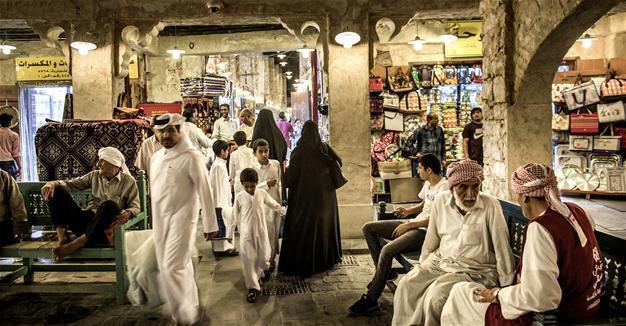Qatar crisis separating families
İpek Yezdani - DOHA

Sanctions and a Saudi-led campaign to isolate Qatar have resulted in the division of a number of families, some of those affected have told the Hürriyet Daily News.
The Arab countries that have moved against Doha, including Saudi Arabia, Bahrain, the United Arab Emirates and Egypt, have called on their citizens living in Qatar to return, warning them that they would be stripped of their citizenship if they do not obey.
Economist Faraj al-Mohammad said the most saddening issue was the separation of families.
“The fact that Saudi Arabia closes the border and imposes economic embargo doesn’t bother us, since we can source all kinds of food and items. However, the separation of families upsets us the most,” al-Mohammad told daily Hürriyet.
“Qatar, Bahrain, Saudi Arabia, the United Arab Emirates and Kuwait are connected to each other with tribes, kinship and marriages. Now they have dispersed this family. They won’t allow me to see my nieces in Bahrain or grandchildren in Dubai. No one has the right to do that to us,” he said.
The Gulf region was “a major family divided in six countries, but now it’s been torn apart,” he said.
Engineer Ibrahim al-Sweydi, meanwhile, complained about not being able to see his relatives due to the severed ties between Qatar and many other countries.
“I have relatives in Saudi Arabia, Bahrain and the United Arab Emirates. Eid al-Fitr is approaching and we normally would visit each other, but now we can’t do so,” al-Sweydi said.
Retired soldier Hasan al-Mohammad felt the severing of ties inside his family, with his wife, a Bahraini citizen, being obliged to return to her country after Manama recalled their citizens from Qatar.
“My wife is from Bahrain and our four children are Qatari citizens. My wife’s country is calling her back, but I don’t want her to leave because if she does, she won’t be able to come back. She, on the other hand, doesn’t want to lose her Bahraini citizenship. We are in a very difficult place,” al-Mohammad told daily Hürriyet, adding that the severing of families was “nonsense.”
“Many families had to be separated. A lot of people were forced to leave their spouses and children to return to Saudi Arabia, the United Arab Emirates and Bahrain. Can there be such nonsense?” he also said.
Bahrain, Saudi Arabia and the UAE signaled on June 11 that they may allow some Qataris to stay in their countries amid a diplomatic rift with the Gulf nation.
Qatar has pledged that those nations’ citizens will have “complete freedom” to stay in the energy-rich country.
The three Gulf nations cut ties to Qatar on June 5 over its alleged support of militants and ties to Iran and ordered all Qataris out within 14 days, while calling their own citizens back. That’s created chaos across the Sunni Gulf nations, whose citizens regularly intermarry and conduct business across countries that share long historic and cultural bonds.
Early on June 12, the three countries all issued statements urging mixed nationality families to call their respective interior ministries, which would take into consideration the “humanitarian circumstances” of their situation.
For its part, Qatar issued an overnight statement saying residents living in the country from nations that severed ties would have “complete freedom” to stay despite the “hostile and tendentious campaigns” now targeting it.
Qataris also said they appreciated Turkey’s support.
“We see the incidents from the same perspective as Turkey,” said al-Muhammad. “We see Turkey not only as a country but a brother.”
Naji al-Nami said he was happy that Turkey was deploying soldiers in his country.
A video, which went viral on social media after being shared by the Qatari emir was prepared by a Turkish doctor working at a Turkish hospital in Qatar, Hürriyet has learned.
The video tells about the close links between the two countries and was sent by Emir Sheikh Tamim Bin Hamad al-Thani to Turkish President Recep Tayyip Erdoğan as a message of gratitude.
It was prepared by Dr. Volkan Uygunuçarlar, who founded the Turkish Hospital in Doha four months ago.
The video was initially prepared after the July 15, 2016, coup attempt in Turkey to tell about the friendship between the leaders of the two countries and was re-shared after the sanctions on Qatar.
A police officer, who did not permit the Hürriyet Daily News to shoot footage in a supermarket, also said he admired Turkey’s support.
After seeing that the team was from Turkey, he displayed a sketch of Erdoğan, saying he drew it himself while asking reporters how he could send it to the Turkish president.
 Sanctions and a Saudi-led campaign to isolate Qatar have resulted in the division of a number of families, some of those affected have told the Hürriyet Daily News.
Sanctions and a Saudi-led campaign to isolate Qatar have resulted in the division of a number of families, some of those affected have told the Hürriyet Daily News.